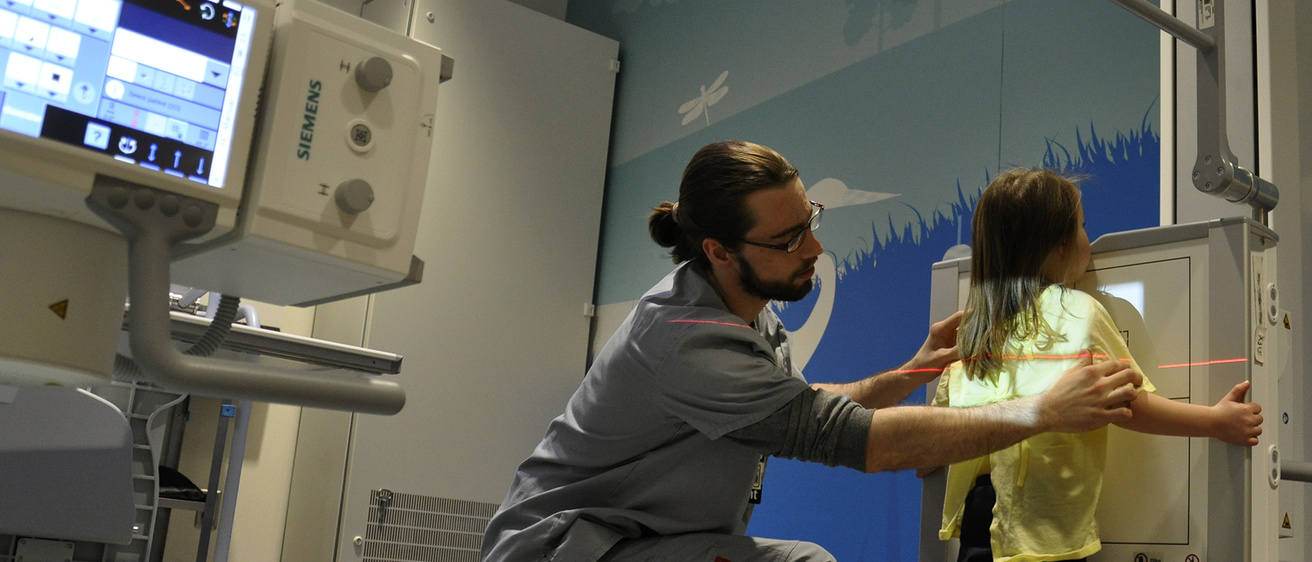The Carver College of Medicine’s Radiation Sciences RT to BS online program is for registered radiologic technologists and nuclear medicine technologists who wish to earn a Bachelor of Science degree with a major in radiation sciences by distance education.
The program requires a minimum of 120 s.h. Students who successfully pass the American Registry of Radiologic Technologists (ARRT) radiography, ARRT nuclear medicine, or NMTCB nuclear medicine board certification exam are awarded 60 s.h. of credit. They also are awarded credit for equivalent course work that is prerequisite to entering the major. Upon admission to the major, students complete an online modality, advanced courses, and electives for graduation.
Students choose one of five modalities: computed tomography (CT), magnetic resonance imaging (MRI), cardiovascular interventional (CVI), breast imaging (BI), or a multi-modality option. The modalities do not require an internship.
Iowa's RT to BS online Radiation Sciences Program has an excellent reputation and grants 60 s.h. of credit for the ARRT(R) registry certification.
The program is sponsored by the University of Iowa Carver College of Medicine. Faculty are affiliated with the Department of Radiology and University of Iowa Hospitals and Clinics (UIHC), one of the nation’s largest public university teaching hospitals. These connections and the program’s location on the University of Iowa health sciences campus provide a wealth of world-class resources and learning opportunities for students.
Information

First-Year
First-year students are not eligible to enter this program. ARRT certification and completion of prerequisites are required.

Transfer
ARRT certification and completion of prerequisites are required to enter this online program.

International
ARRT certification and completion of prerequisites are required to enter this online program.
The career outlook for radiation sciences graduates is excellent and the majority of students are employed soon after graduation. Graduates generally find jobs in hospitals, clinics, imaging centers, and physicians’ offices. A BS degree is required for most radiology management, sales, applications, and education jobs.
The American Society of Radiologic Technologists' Wage and Salary Survey reports the median national salary at $69,896 for CT technologists, $71,725 for breast imaging technologists, $76,072 for CVI technologists, and $76,177 for MRI technologists.
The U.S. Bureau of Labor Statistics' Occupational Outlook Handbook reports the national median wage estimate in 2020 was $61,900 for radiologic technologists. Students are prepared (with the exception of clinical competencies) to apply for the ARRT advanced certifications in BI, CVI, CT, or MRI.
Visit the Radiation Sciences website for a list of partnering institutions that provide the clinical competency opportunities for CVI, CT, or MRI that are required for the advanced certification ARRT board exam.
The University of Iowa provides a variety of scholarships to eligible undergraduate students through the Iowa Scholarship Portal. Scholarships are available to first-year, transfer, and currently enrolled students. For additional details on scholarships for your program of study, check directly with the department or college.
The Department of Radiology awards the Scot Heery Scholarship to three seniors each year in recognition of their work ethic and daily commitment to quality patient care.
The Office of Admissions and the Office of Student Financial Aid are great resources for students seeking scholarships.
The components to the RT to BS Online Radiation Sciences program are: prerequisite course work, including the ARRT(R) certification; online course work in breast imaging (BI), cardiovascular interventional (CVI), computed tomography (CT) or magnetic resonance imaging (MRI); and online advanced course work in statistics and management/leadership.
Prerequisite course work includes completing GE CLAS Core requirements, including the required courses for radiation sciences, as outlined in Radiation Sciences RT-BS in the UI General Catalog. Prerequisite course work and the radiologic technology program may be completed at another academic institution. See Transfer Admissions Requirements.
Students must complete the final consecutive 30 semester hours through the UI Carver College of Medicine in order the satisfy the residency requirement.
